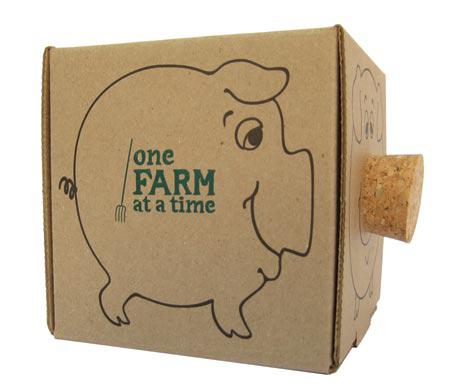Saving One Farm at a Time

Like most food cooperatives, the Sacramento and Davis co-ops have longstanding and strong commitments to purchasing from and supporting local farms. And they realize that local farmland is under constant pressure from developers motivated to capitalize on its nonagricultural value. The resulting inflation of the cost of those lands above their strictly agricultural value puts them beyond the reach of future farmers. This has resulted repeatedly in farms being lost when farmers reach retirement age and choose to support their retirement by selling their farms. Current estimates that there are six farmers over the age of 60 for every one farmer under the age of 30 do not bode well for the future of local agriculture.
The prospect of seeing our local farms turn into ranchettes or strip malls left us very concerned. We knew that one mechanism to prevent that from happening was for land trusts to purchase easements from farmers that would place restrictions on how that farm could be used. And we were familiar with the efforts of Annie and Jeff Main, the owners of Good Humus Produce—one of our local partners—to create a unique (to California) easement that affirms that not only will the farm's land be kept from development, but that it also will be farmed organically, that the farmer will live on the land and earn at least 50 percent of his or her income from the farm. But we were also aware that local land trusts typically lack the funding to purchase easements for small to medium-sized farms.
So we applied some co-op mathematics to the situation by dividing what looked like a big problem into many small parts. With a base of nearly 40,000 shoppers at our two co-ops, we decided we had a huge pool to draw from and that we would take on the job of raising the money to finance those easements. Our plan is to raise awareness that preserving our local farms is in the direct interest of our shoppers and of their grandchildren's grandchildren. Our message is that relatively small investments from individual customers, when pooled, can amount to funds significant enough to purchase the Good Humus easement and then to go on to preserve other farms. Hence the project's name: One Farm at a Time.
Getting started
We began by finding partners and found them in two local land trusts (Yolo and Tuleyome) and the Twin Pines Cooperative Foundation (TPCF). The co-ops will raise funds from their shoppers and their communities and deposit the funds with TPCF.
In addition to raising the funds that will be used for farm preservation, another goal of our efforts is to create a sense of partnership between our customers and our farmers. Funds raised at each co-op are being parked at TPCF until such time as there is enough money to finance an easement or to support other methods to preserve farms (e.g., purchase of land, financing of capital improvements for local farmers, investment in infrastructure that would support the viability of local farms). Each co-op will have a group of trustees that will decide which farms we will work with in the future. While our message is that money given toward the easement purchase is a social investment, with no financial return, TPCF's 501(c)3 status does allow for donations to be tax-deductible, giving a small financial incentive to donors.
After a year of putting the pieces together, we slowly began to roll out the program in July. Sacramento and Davis Co-op employees received an hour-long training on the program's benefits so that they would be better prepared to carry its message to our shoppers. Many co-op employees then decided to take part by making voluntary payroll deductions.
Getting buy-in
The simple message that we bring is that if all of our shoppers get involved for as little as $10 per year (or, more simply, 3 cents per day) there will be enough to preserve Good Humus as an organic farm in perpetuity. We are developing a variety of ways for shoppers to participate, from purchasing One Farm at Time merchandise to attending fundraisers or making donations at the checkout stands. To get children involved, we have created One Farm at a Time piggy banks that we sell and that kids can fill up and return when full.
We approached a handful of our suppliers asking for grants to defray the program's start-up costs. We were encouraged by the immediate support that we received from Veritable Vegetable, Equal Exchange, Lundberg Family Farms, and Organic Valley, who together donated $20,000. Equal Exchange and Straus Family Creamery have also committed a percentage of the proceeds from the sales of their products to the program. We are looking to partner with other vendors, as well as local restaurants and businesses, to bring the One Farm at a Time message further into the community.
So far, the Davis and Sacramento co-ops have raised $31,000. Our greatest challenge has been finding ways to communicate about the way that the easement mechanism works and how it has the potential to make farms permanently affordable to new farmers—but once people understand that, they have become enthusiastic supporters. So, we are investigating other partnerships that may provide us the resources to more effectively communicate our message.
We believe that once we road test the model in Sacramento/Davis it could be rolled out nationally using TPCF's national cooperative connections. If adopted one co-op at a time, the program could result in the preservation of hundreds of farms for future generations of co-op shoppers. ■
For further information, got to www.sacfoodcoop.com and click on the One Farm at a Time logo on the home page, or contact Paul Cultrera at 916/869-6400 or at gm@sacfoodcoop.com.







